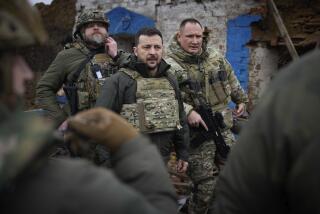For Soviet Marshals, a Season of Setbacks : The High Command Has Been Shaken Up, but Officers May Be Taking Down Names
- Share via
The recent resignation of Marshal Sergei Akhromeyev as chief of the Soviet general staff and the shift in military leadership to a little-known replacement, Col. Gen. Mikhail A. Moiseyev, marked the latest move in Soviet President Mikhail S. Gorbachev’s sweeping campaign to bring the armed forces into lockstep with his perestroika reform effort.
That campaign, which began shortly after Gorbachev assumed power in March, 1985, was first reflected in a wholesale forced retirement of many top officers. It gained a boost in May, 1987, when the surprise landing of a Cessna in Red Square by a young West German amateur pilot gave Gorbachev a needed pretext for turning out the incumbent defense minister, Marshal Sergei L. Sokolov, and replacing him with a personal loyalist, Gen. Dmitri T. Yazov. Late last summer the tough-talking Marshal Nikolai V. Ogarkov, commander of the western front and, by all accounts, the most respected Soviet military strategist, was also eased out quietly after having long been a thorn in the side of the civilian leadership. Now, with the installation of Moiseyev, Gorbachev’s shakedown of the high command is complete.
In making this assignment, Gorbachev reached deep into the ranks and, by so doing, confirmed his total political subjugation of the armed forces. Even during the rule of Josef Stalin or Nikita S. Khrushchev, nothing quite like this has ever happened in Soviet party-military relations.
Why Akhromeyev was relieved is not known. The best evidence suggests that he had a falling-out with Gorbachev over the Soviet president’s Dec. 7 announcement at the United Nations that Moscow was ready to undertake a unilateral force reduction of 500,000 men, including 50,000 troops and 5,000 tanks in the Warsaw Pact forward area. For more than a year beforehand, Akhromeyev and other military leaders had insisted that the armed forces could never countenance any such unilateral move, since, in their view, the Warsaw Pact and the North Atlantic alliance were already of equal military stature. This stance was provoked by some earlier writings by civilian backers of Gorbachev’s doctrine of “defensive sufficiency,” who had broadly advocated that the Kremlin consider such cuts.
This latest episode has occurred against a backdrop of mounting military discontent over perestroika . The marshals have grudgingly supported Gorbachev’s reform effort, insofar as it has sought greater efficiencies in the defense sector and promised continued Soviet military competitiveness into the 21st Century. But the high command some time ago drew the line when it came to unilateral cuts. Indeed, not long after the idea was first broached by a civilian enthusiast, Vitaly Zhurkin, the Soviet air defense commander, Gen. Ivan M. Tretyak, took violent exception, countering that similar cuts forced on the military by Khrushchev in the early 1960s had severely undermined Soviet combat capability and that the defense needs of the Soviet state remained “absolute.”
The loss for the marshals reflected in Akhromeyev’s step-down comes at a time when Moscow’s would-be civilian “defense intellectuals” have begun to see their own political stars on the rise. With Gorbachev’s encouragement, members of various institutes of the Academy of Scienceshave been forcefully elbowing their way into a more active role in Soviet defense planning. These individuals are aware of the influence commanded by their counterparts in the West, and they are jealously seeking a comparable place for themselves in the Soviet defense Establishment. Under the license granted by glasnost , some have emerged as outspoken critics of the armed forces and, in several instances, have indulged in open military bashingin the pages of the Soviet press. Undoubtedly they enjoy the protection of Alexander N. Yakovlev, Gorbachev’s principal deputy on the Politburo and a former director of one of the most prominent of these research centers, the Institute of World Economy and International Relations. These civilians are clearly staking out a claim to countervailing expertise in security affairs. They are also showing impressive success, as attested by Gorbachev’s acceptance of their arguments in the face of vocal military opposition.
Whether they have gained much real “insider” status in the defense Establishment beyond that remains to be seen. For the moment, Gorbachev appears to have solidified his grip over the armed forces. Insofar as he can make that achievement stick and carry off the troop cuts as announced in New York, it bodes well for a productive conventional arms-control dialogue with the Bush Administration. It is doubtful, however, that Gorbachev has succeeded in co-opting the Soviet military in the course of making these changes. More likely he has planted the seeds of ill will among many sectors of the officer corps, whose leaders have fallen back on sullen acceptance and a quiet taking of names against any future chance to settle scores should Gorbachev’s political fortunes on the home front begin to falter.
More to Read
Sign up for Essential California
The most important California stories and recommendations in your inbox every morning.
You may occasionally receive promotional content from the Los Angeles Times.













